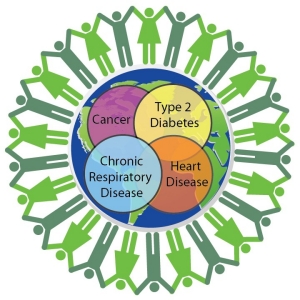Non-communicable diseases (NCDs) such as type 2 diabetes, heart disease, stroke, cancer, asthma and dementia are so common worldwide that they are now considered to be an epidemic. NCDs are the leading cause of global death and are associated with substantial society and healthcare costs. We urgently need new ways to reduce the occurrence of NCDs in our community.
Research from the field of Developmental Origins of Health and Disease (DOHaD) shows that NCD risk is influenced by nutritional and non-nutritional exposures in early life (even before we are born), as well as factors such as family history, nutrition and lifestyle in adulthood.
The opportunity for communities to consider this knowledge, and develop programmes and strategies to support improved nutrition and well-being for future parents, pregnant women, infants, children and teenagers is valuable. It offers opportunities for preventing risk factors that contribute towards NCDs. But before programmes are designed to support communities to understand this evidence and act on it, we need to find out what the public understands about NCDs, NCD risk factors and DOHaD concepts. This information will help us to develop programmes based on what is needed, and are therefore more likely to succeed.
This research is exploring DOHaD awareness and understanding in a range of groups including the general public, teenagers, health professionals, and teachers.
Research Team
- Dr Jacquie Bay, Director LENScience, Liggins Institute, University of Auckland, New Zealand (Principal Investigator, New Zealand).
- Professor Masahito Oyamada, Department of Food Science and Human Nutrition, Fuji Women’s University, Sapporo, Hokkaido, Japan (Principal Investigator, Japan).
- Associate Professor Robyn Dixon, School of Nursing, University of Auckland, New Zealand
- Dr Gigi Lim, Senior Lecturer, School of Nursing, University of Auckland, New Zealand
- Dr Clare Wall, Department of Nutrition, University of Auckland, New Zealand
Postgradudate Students:
- Heimata Herman, Liggins Institute, University of Auckland
- Alvina Pauuvale, Liggins Institute, University of Auckland
- Siobhan Tu'akoi, Liggins Institute, University of Auckland
Porject Presentations
Poster presentation at the 4th Annual Meeting of the Japan Society for DOHaD, 1–2 August 2015, Tokyo, Japan
Poster presentation at the 12th Asian Congress of Nutrition, 14–18 May 2015, Yokohama, Japan
Poster presentation at the 9th World Congress of Developmental Origins of Health and Disease, 8–11 November 2015, Cape Town, South Africa
Poster presentation at the 10th World Congress of Developmental Origins of Health and Disease, 15–18 October 2017, Rotterdam, the Netherlands
Publications
Oyamada, M., Lim, A., Dixon, R., Wall, C., & Bay, J. (2018). Development of understanding of DOHaD concepts in students during undergraduate health professional programs in Japan and New Zealand. Journal of Developmental Origins of Health and Disease, 1-7. doi:10.1017/S2040174418000338
Bay J, Dixon, R., Morgan. S., Wall, C., Oyamada, M. Characterising Public Understanding of DOHaD to Inform Communication Strategies. 9th World Congree Developmental Origins of Health and Disease Nov, 2015; Capetown, South Africa: Journal of Developmental Origins of Health and Disease 2015.
Oyamada M, Dixon R., Wall C., Lim A., Bay J. Characterising the potential of undergraduate courses to facilitate understanding of DOHaD concepts in populations of future health professionals. Journal of Developmental Origins of Health and Disease. 2015;6(Supplement S2):S75.
Endo A, Oyamada M. On Japanese female university students' perception of developmental origins of health and disease: a questionnaire survey. J Dev Orig Health Dis. 2013;4 Suppl 2:S162


